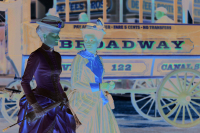News
Forging ahead: HBO illustrates economics, culture of 'The Gilded Age'

Carrie Coon and Morgan Spector star in "The Gilded Age"
Nothing quite compares to the glitz, glamour and gore of American robber barons — rich industrialists who used wealth, political connections and violence to secure their empires. The Gilded Age was for the elite and rapidly growing, and if you weren't elite, chances are you were working for someone who was.
HBO's new drama "The Gilded Age" takes a closer look at the titular time period that helped shape the nation. Premiering Monday, Jan. 24, the series stars Carrie Coon ("Ghostbusters: Afterlife," 2021), Morgan Spector ("The Plot Against America"), Louisa Jacobson ("Gone Hollywood," 2019) and Denée Benton ("Our Friend," 2019).
Networks and streaming services have explored much of the British upper class across the Victorian era, Regency period and just about everything else pre-1920s — they've even dabbled in Viking- and Roman-era Europe, but they haven't done much with the great Gilded Age of the United States — until now.
HBO's new series kicks off in 1882 (about a decade into the titular age), when a young woman named Marian Brooke (Jacobson) moves from rural Pennsylvania to New York City after the death of her father. Now living with her two wealthy aunts, Agnes van Rihjn (Christine Baranski, "The Big Bang Theory") and Ada Brooke (Cynthia Nixon, "Sex and the City"), she lives off the "old money" they represent in a society that's quickly and consistently pushing forward.
When a social war erupts between Marian, one of her aunts, a railroad tycoon (Sector) and the tycoon's wife (Coon), the tension embodies the shift from old money to new power: a Gilded Age of transformation. Fortunately, Marian isn't alone in the fight. She's joined by Peggy Scott (Benton), an aspiring writer looking for a fresh start after finishing her education.
The New York City setting makes the Victorian dress, upper-class glamour, rich and full-bearded men and flawlessly dressed women pop off the screen in a truly unique way — not to mention it makes the Gilded Age look like a whirlwind of exhilaration. Though, considering the show's writer, this comes as no surprise.
Julian Fellowes, best known for his work on "Downton Abbey," acts as both writer and executive producer of "The Gilded Age." Before the series made the move to HBO, Fellowes was in negotiations to launch the series on NBC. And while he later expressed his appreciation to NBC for allowing him to start a passion project and finally get to actualize his love affair with the era in the United States, "The Gilded Age" eventually found its home on the specialty channel instead.
Fellowes began writing the show for NBC back in 2012, but the timing wasn't right. The overwhelming popularity of his claim-to-fame kept him tethered to "Downton Abbey," and it wasn't until 2018 that he picked up the project again. Nearly four years later, the period project is ready for release.

Louisa Jacobson and Denée Benton as seen in "The Gilded Age"
Knowing the writer behind the script, fans can bet that "The Gilded Age" will feature proper manners with an irresistible sensuality, just like "Downton Abbey." That said, this series takes place decades before its British parallel and, "Toto ... we're not in [England] anymore!"
This turn-of-the-century rendering of the United States presents a grittier, more uninhibited society to viewers than its English counterpart, and if ever there were an era in time to which the phrase "more money, more problems" applies, the Gilded Age is it.
The era was a time of evolving ideologies, where capitalism ripened and greed remained a constant underpinning in every advancement. Technically marked as the years between 1870 and 1900, the era directly followed the Civil War. As technology and industry boomed, so, too, did the reputation of those leading the charge. The result was uninhibited success coupled with endless corruption and a severe exploitation of the working class.
It's no surprise that one of the show's central protagonists, George Russell (Sector), just happens to be a railroad tycoon. Arguably, the Transcontinental Railroad was the era's most impressive progress. The 1869 completion of the railway meant faster expansion into the western side of the United States and easier transportation of goods and materials. Railroad investors received millions of dollars and acres of land as a result of their efforts, and they thus became known as the "new rich."
But while the Rockefellers and Vanderbilts of society ate lavish meals, children of poor families were forced into sweatshops. Tenements grew problematic, immigrants increasingly became the victims of a budding eugenics movement, and freed slaves faced immense hurdles. Could this sharp contrast play a part in the contention between the Brookes and the Russells?
By the end of 1900, approximately 40% of people in the United States lived in cities. Will Fellowes explore the scandal and seduction of this historic period while paying respect to the diverse experiences of people living in NYC at that time? It's a tall order, to say the least.
Find out how it all begins when "The Gilded Age" comes to HBO on Monday, Jan. 24.
More Articles
- The 'Continental' experience: John Wick franchise gets three-night TV stay
- The 'Continental' experience: John Wick franchise gets three-night TV stay
- Dixon days: Daryl dominates new 'Walking Dead' series
- Dixon days: Daryl dominates new 'Walking Dead' series
- In the mood for mystery: Detective dramas return with back-to-back premieres
- In the mood for mystery: Detective dramas return with back-to-back premieres
- In the mood for mystery: Detective dramas return with back-to-back premieres
- Powerful forces: 'Ahsoka' must save the universe in new Star Wars spinoff series
- Powerful forces: 'Ahsoka' must save the universe in new Star Wars spinoff series
- Rocking reflections: Paramount revisits Elvis Presley’s 1968 special
